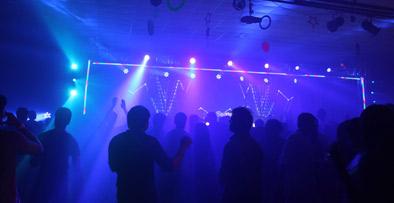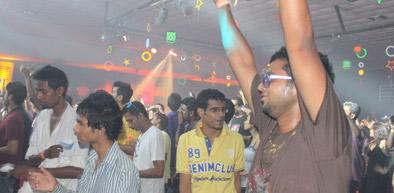Bangalore, 24.4.2012: German Musicians and DJs Club-Hopping in Bangalore
 At midday on a Monday nothing is happening in the clubs of Bangalore, there are no guests. Despite the unusual time of day, a group of Germans is taking a look at several party zones in the city: the jungle lounge Pebble, the Wedding Place right next door, the big hall in the Maharaja Palace, the Counter Culture and the Jaaga. And on their club-hopping tour they see everything they want to see – locations where they can perhaps perform.
At midday on a Monday nothing is happening in the clubs of Bangalore, there are no guests. Despite the unusual time of day, a group of Germans is taking a look at several party zones in the city: the jungle lounge Pebble, the Wedding Place right next door, the big hall in the Maharaja Palace, the Counter Culture and the Jaaga. And on their club-hopping tour they see everything they want to see – locations where they can perhaps perform.
The twelve Germans are live artists and DJs as well as organisers of music festivals and people from the music industry. They are exponents primarily of electronic music, but not only: there is also someone here from Wacken Open Air, the world’s biggest heavy metal festival in the conurbation of Hamburg. They are staying in India for twelve days, including two days in Bangladore. Their aim is to set up networks between German and Indian artists, producers and music presenters. And this not only in the Germany and India Year 2011/2012, but also with a long-term perspective. Contacts have existed for about five years. The Indian DJ duo Blot, for example, has visited Germany several times. “We have the same aims, we can achieve them better by working together. This helps our scene, and also the whole music trade,” says Nadine Riede from the Berlin Music Commission. Ralf H. Christoph from the Cologne Festival c/o pop adds: “In India Bollywood music is bigger than anything else, bigger than Madonna, Rihanna or Katy Perry. This is unique throughout the world. Nevertheless, there are more and more people who are interested in electronic music from Western Europe. The decisive driving force here is the internet.”

On Sunday evening four DJs from Berlin, Hamburg and Cologne performed on stage at the festival “Supermova” for electronic music in Bangalore. The twelve travellers had been to Mumbai first and are now flying on to Delhi. In workshops they will be reporting on how they organise large mass festivals with regard to logistics, security and cleanliness, how they promote events, which basics are essential in contracts with German artists or how to set up a label.
German musicians and DJs like playing in India because the scene is very exciting for them, because they have fans here and for many Indians it is hardly possible to fly to a festival in Germany. But there are also big differences. Electronic music in Germany comes from the underground, from the streets. It often originates in buildings that are temporarily occupied – there are hardly any such places in India. And foreign artists often play in India to a very affluent audience that can afford high admission prices (at the Supermova the ticket costs 1,500 rupees, for Early Birds 800 rupees). And a still bigger difference: in Kamatka events must end by 11 p.m. In Germany, in contrast, partygoers don’t set off until around midnight. They dance and rave until the morning hours, then go and have breakfast.
published on 24 April 2012 in Leipziger Volkszeitung.
Translated by Faith Gibson.








